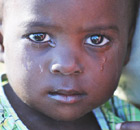Top News
Haiti warned to brace for another big quake
(Agencies)
Updated: 2010-02-01 23:00
 |
Large Medium Small |
PORT-AU-PRINCE: Haiti should be preparing for another major earthquake that could be triggered by the catastrophic one last month which killed up to 200,000 people and left the capital Port-au-Prince in ruins, experts say.
Teams of geophysicists, who have been tracking movements in the fault line that slashes across Haiti and into the Dominican Republic, came to the nation last week to measure changes in the Earth's crust after the 7.0-magnitude quake on Jan. 12.
Increased pressure on the fault after the quake could unleash another of the same size or bigger, although scientists acknowledge they have no way of knowing exactly when or where it will hit.
"Faults are always waiting for the right moment but if another earthquake gives them a little kick they go before their time," said Eric Calais, a professor of geophysics from Purdue University in Indiana, who is leading the seismology project in Haiti.
Preliminary calculations by his group show the Jan. 12 quake could be the "little kick" that sets off another temblor along the 186 mile (300 km) fault where two regional tectonic plates have been scraping together for millions of years.
More than 50 aftershocks, including one measuring 5.9 magnitude, have shaken Port-au-Prince after last month's quake. The US Geological Survey says the aftershock sequence will continue for months, "if not years", and "damaging earthquakes will remain possible in the coming months".
Haiti's government has announced plans to relocate up to half a million homeless quake victims -- many now camped out in rubble-strewn streets -- in temporary villages outside of Port-au-Prince. But some experts suggest the whole capital should be rebuilt away from the dangerous fault line.
Quake prediction not an exact science
Calais was part of a group of experts who warned Haitian officials in 2008 that there could be a 7.2 magnitude quake on the horizon.
But Haitian officials said there was not enough time or funds to shore up the impoverished Caribbean's country's shoddy construction or take precautions, and in last month's quake, many buildings pancaked, their bricks crumbling to dust.
"It's not too late. Now is the time to really get serious about this," Calais said.
Over 200 years ago, when Haiti saw its last major earthquake, there were actually several temblors in a row, two in 1751 and another in 1770, Calais said.
In one destroyed neighborhood in the Haitian capital, where people now live in tents made of bed sheets and sticks, curious children watched the scientists set up specialized global positioning systems. The devices, placed at different points along the fault, will gather data over three days and compare it to information gathered over the past five years.
But for all the precise measurements, there is no such thing as an exact science of earthquake prediction.
Haiti's national geological survey offices collapsed in the quake, killing some 30 people inside, including the institute's director. This complicates future research in a country that has no seismic network, except for Calais' GPS monitors.
"Scientists are blind when it comes to this earthquake ... We rely on data that is coming from stations that are far away," he said.
"It's like if you go to your doctor and the only thing we can do is look at you with binoculars -- so the diagnostic would be pretty poor."












